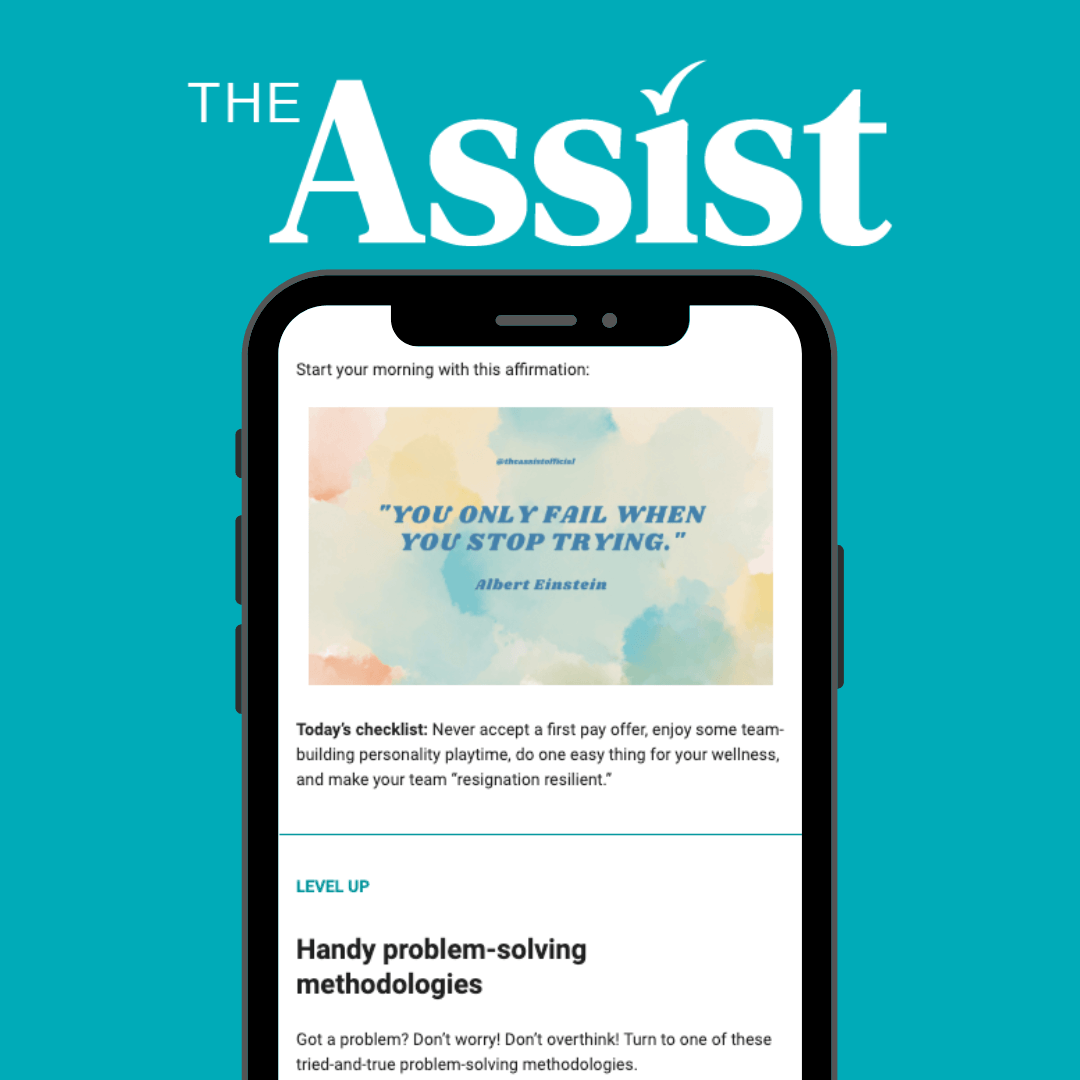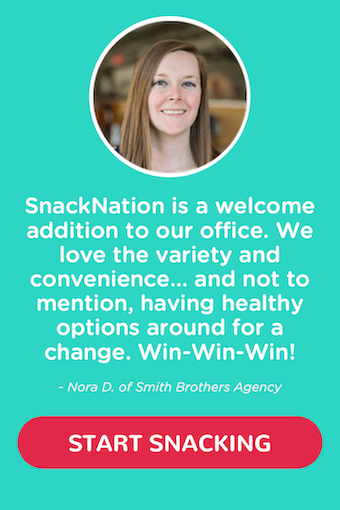
Few jobs offer perks that rival the experiential benefits of being an Executive Assistant (EA).
Executive Assistants do a lot of different things, work with a lot of different people, and end up advancing to a lot of different careers. This position comes along with variability, excitement, and independence.
The Assist is a free weekly email that makes becoming a better professional actually enjoyable.
⭐️ 4x a week, we send our newsletter full of actionable tips to thousands of problem-solving go-getters, like yourself.
Subscribe today and see why over 35,000 Executive Assistants and other Admin professionals, like you, welcome us into their inboxes ❤️
(Join our private Facebook Group for executive assistants. It’s a community to connect, collaborate, and share advice on how to overcome the wide spectrum of challenges you face in your role.)
If you’re considering a career in Administration, then you should definitely check out these 10 benefits of being an Executive Assistant.
One of our favorite tools for EA’s right now is productivity software monday.com. Test out the free trial period and see what you think!
Top 10 Benefits of Being an Executive Assistant
1. Getting to do a little bit of everything.
We mentioned above that Executive Assistants get to work with everyone. Well, Executive Assistants also get to do a little bit of everything.
As true champions of every aspect of the success of their companies, Executive Assistants constantly jump in to support the company leaders they serve in any way they can. This means they end up truly doing anything and everything.
Pro-Tip: Doing it all can be challenging, even overwhelming, at times. Get the tips and tricks you need to do it all with ease and enthusiasm by signing up for The Assist, a weekly email newsletter that delivers the tips, tricks, and encouragement you need to get absolutely everything done.
Appeals to: Go-getters who love a good challenge
People who love learning new things, performing a lot of different duties, and solving a diverse range of challenging problems will thrive in the bustling, ever-changing arena of an Executive Assistant career.
2. Working with everyone at the company.
Executive Assistants touch on all key aspects of a company’s operations, including scheduling, onboarding new employees, managing office perks, implementing processes that affect all employees, designing office layouts, and so much more.
In the course of all this work, EAs end up working with and becoming friends with almost everyone at the company.

Appeals to: Outgoing, extroverted personalities
If you like working with a variety of different personalities and building relationships with a tons of different people, then an Executive Assistant role offers plenty of excitement and satisfaction.
3. Guiding a company’s strategic direction.
Business leaders count on their Executive Assistants to provide guidance and strategic counsel in matters both great and small. A trusted Executive Assistant will likely be right there in the boardroom as business leaders deliberate on whether or not to expand the business into international territory or acquire a new subsidiary.
As a result of being a front-and-center resource for key business decisions, Executive Assistants get to take ownership of businesses and guide strategic company direction with almost as much influence as the business leaders themselves.

Appeals to: Decision makers
Anyone who gets a thrill from analyzing the pros and cons of high-profile decisions will love the aspects of Executive Assistant careers that touch on business strategy.
4. Making plans.
Executive Assistants spend a bulk of their time organizing, planning, strategizing, mapping, calculating, you name it.
Assistants have to manage Executives’ jam-packed calendars and find the most strategic ways to fit important events into limited time frames. They also have to plan schedules, office layouts, and strategic company initiatives. EAs plan out workflows and draft timelines and manipulate moving parts and pieces to make projects work and things happen.

Appeals to: Super-organized individuals
There’s no shortage of work to plan and information to organize in an Executive Assistant role. People who love manipulating pieces of information until everything is arranged in a logical place and order will love the planning challenges of EA work.
The planning aspect of the work will also appeal to people who have a knack for arranging and keeping track of information.
5. Finding growth within the same role.
Executive Assistants can expand their roles as they develop new skills. So EAs can stay in the same role for a decade, but essentially do a different job every single year.
Since EAs pitch in to help in any way possible, they are constantly exposed to opportunities to develop new competencies. This means they can expand the tasks they help with to incorporate their new skills and interests. And since an EAs work is really never done, the possibilities are virtually endless.
Appeals to: Self-starters
Anyone who has always wanted to “build their own career” (so to speak) will find something akin to that in an Executive Assistant role. There will of course be priorities to cover, as mandated by the executive in question. But as there are always a million things any given executive needs to do, then there are a million ways an Executive Assistant might choose to build new skills and help out.
6. Being in the know.
Executive Assistants find out what’s going on before almost anyone else. They sit it on key meetings, offer input on critical decisions, and liaise with multiple teams and even partner companies.
Executive Assistants are probably among the first to find out when a CEO decides to leave the company. (After all, they’ll probably be critical to making plans for figuring out what to do when the big boss actually leaves.) EAs will probably also hear first if say—leadership decides it’s time to pick a new office space; they’ll be front and center in that process as well.

Appeals to: Process wonks
When someone loves knowing what’s going on, it’s usually because they want to have a hand in figuring out what comes next; they love to find ways to take the information they have and translate it into process updates and plans that make sense. Anyone who loves learning how things are or how things should be will love being in the informed position of Executive Assistant.
(P.S. – Get more sh*t done with The Assist — the #1 free 4x weekly newsletter made for assistants by assistants.)
7. Facing challenges and solving puzzles.
Executive Assistants face challenges and problems every single day, sometimes every single minute. How are we going to plan a leadership summit this year that actually accomplishes a goal?
How will we fit all these must-do meetings into the calendar for the London trip? How can we resolve this payroll emergency before anyone finds out? These are all questions Executive Assistants might face. (And these questions make up just a sampling of potential questions.)

Appeals to: Problem-solvers
Problems tend to make some people freak out and shrink up and then energize others and inspire them to spring to action. Executive Assistants that fit the second profile will thrive when it comes to the problem-solving aspect of EA roles. Problem-solving also appeals to people who love a good mystery or puzzle—people who will stop at nothing until they figure out the answer to their problem.
8. Enjoying a variable, but busy, schedule.
Most Executive Assistants don’t work a typical 9 to 5. They have to be ready and willing to help out when duty calls. And since Executives are never truly off the clock, their “partners in business” never clock out either. Most EAs never repeat the same day twice; that makes an EA’s schedule variable, but incredibly exciting. They might start one day at 6 AM and end the next day at midnight.
Appeals to: Variety seekers
The never-stop schedule of EA work appeals to people who grow bored easily, people who find regular work hours dull instead of comforting. Instead of being overwhelmed by a constantly changing schedule, these people thrive under the mantle of change.
9. Learning a little bit of everything.
As Executive Assistants work with everyone and do a little bit of everything, they also learn a little bit of everything. In fact, in a recent State of the Executive Assistant Report, 5% of surveyed assistants said that “learning from the boss” is the most enjoyable part of the job.
Executive Assistants learn constantly, whether they’re learning straight from the boss, learning from collaborating with lots of other teams, or simply learning by solving problems and tackling projects.

Appeals to: Curious people
Almost everyone has a vision of what professional life will be like: Doing exciting things, meeting exciting people, and learning something new every day. Executive Assistants really do learn new things every single day. Executive Assistant roles, and the learning that comes with them, make a perfect fit for people who are curious about anything and find a learning opportunity in everything.
10. Lifting people up.
Since Executive Assistants work with so many people, they end up in unique positions to help people and boost morale across the company.
Whether it’s helping someone smile through a bad day or simply helping someone solve a problem that’s setting them back, the everyday actions of Executive Assistants have the ability to make lives better.
Appeals to: “People” people
Anyone who loves working with or helping people will find great satisfaction in an Executive Assistant role. These service-oriented roles provide plenty of opportunities to make a difference. An Executive Assistant might lead plans for an employee perk initiative that increases job satisfaction. They might also develop a new work process that saves someone multiple hours per week. How satisfying is that?
What do you find to be the biggest benefit of being an Executive Assistant? We want to hear about it! Let us know in the comments below.
(P.S. – Get more sh*t done with The Assist — the #1 free 4x weekly newsletter made for assistants by assistants.)
People Also Ask These Questions About Benefits of Being an Executive Assistant
Q: How does being an executive assistant help in developing strong organizational and multitasking skills?
- A: Being an executive assistant is like orchestrating a symphony of tasks. You learn to harmonize schedules, projects, and priorities, honing your organizational skills to perfection. Multitasking becomes second nature as you seamlessly navigate a whirlwind of demands, a skill that not only impresses but also propels you forward in your career.
Q: What are the career growth opportunities for executive assistants, and how can they advance in their careers?
- A: The career path of an executive assistant is like climbing a ladder with endless rungs. Beyond the title, you can pivot into roles like office manager, project manager, or even transition into specialized areas like event planning or HR. Success in this role often depends on building a toolkit of soft skills, networking, and a deep understanding of the company’s inner workings.
Q: What role does confidentiality play in the daily work of an executive assistant, and how is it maintained?
- A: Confidentiality is the guardian of an executive assistant’s realm. It’s the unbreakable bond of trust between you and your executive. You handle sensitive information with utmost care, knowing that discretion is your superpower. Maintaining it is an art of impeccable judgment, where walls have ears, and secrets remain locked in the vault of your professionalism.
Q: What strategies can executive assistants use to stay organized and on top of their tasks and responsibilities?
- A: Executive assistants are the conductors of workplace symphonies, and staying organized is their baton. To harmonize tasks and responsibilities, they can employ a melody of techniques: first, embrace digital tools like task management apps to create a digital score of daily tasks. Second, practice the art of delegation judiciously, recognizing that not every note needs your touch; delegate the crescendos to trusted colleagues. Lastly, conduct regular overtures with your executive to align priorities and expectations, ensuring a harmonious performance that keeps you on top of your game.
Q: What are the advantages of working as an executive assistant in different types of organizations, such as startups vs. large corporations?
- A: Working as an executive assistant in startups and large corporations offers distinct advantages. In a startup, you’re the Swiss Army knife, wearing multiple hats and influencing the organization’s growth from the ground up. In contrast, at a large corporation, you have access to abundant resources, structured career paths, and a chance to specialize in specific areas. The choice depends on your appetite for dynamism versus stability and your preferred canvas for professional impact.










Love this article! Thanks
Nice article and relatable !!
Thanks so much for this article! I’m thinking about accepting an EA offer, and this helped me a ton!
Congrats Sara!